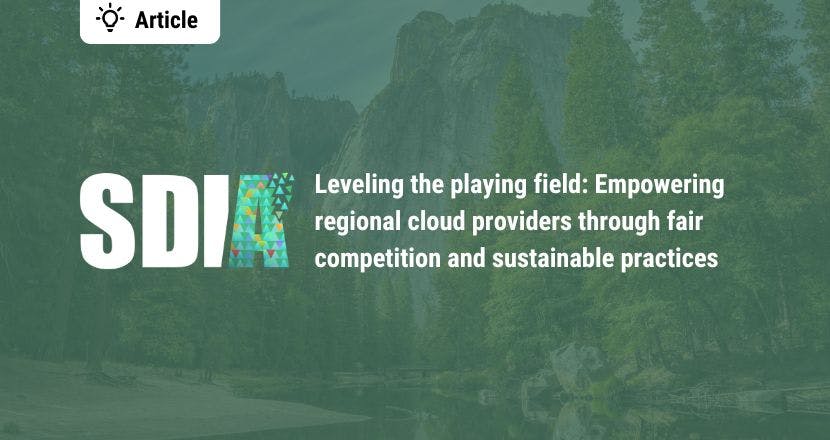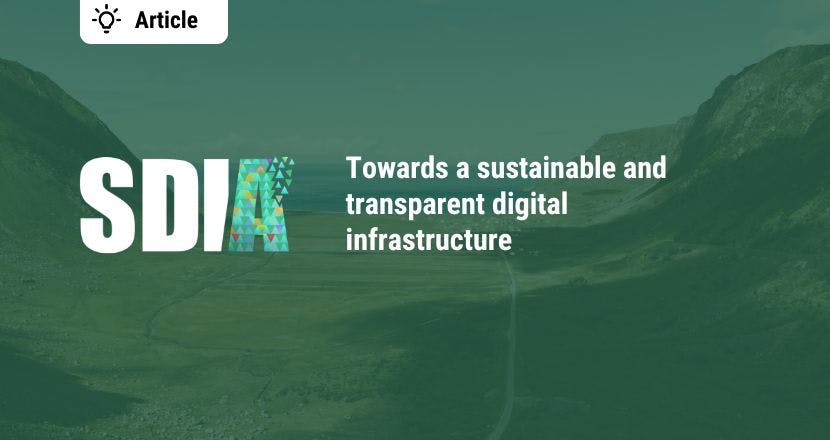Over the past decade, cloud computing has emerged as the dominant paradigm for procuring IT infrastructure for businesses. Amazon launched the market for on-demand data processing, storage and transfer capacity with Amazon Web Services (AWS). Google and Microsoft quickly followed suit, forming the oligopoly we have today.
From the beginning, regional IT infrastructure companies trying to enter and participate in the new cloud computing market found themselves struggling. Becoming a cloud provider requires scale, vast amounts of capital, and the ability to absorb the risks of underutilized infrastructure.
We believe governments play a crucial role in bringing down market barriers by implementing a market design that focuses on improved competition and a level playing field.
Implementing supportive policies to enhance regional resilience and competitiveness
This approach has been successful in the energy market, where government intervention – the introduction of a European market design – has fostered the development of renewable energy sources and supported competition in energy production, allowing citizens to participate with their own energy generation capacity (rooftop PV, for example). Similarly, by creating a supportive environment for regional cloud services, governments can support sustainable regional digitalization and improve the competitiveness of the local digital economy.
A successful digital economy can distinguish itself from global competition by leveraging regional and sustainable resources that align with local values and have a lower environmental impact.
After all, it is the regional IT experts and service or infrastructure providers who are the true drivers of digitalization. These regional IT service providers are ready to offer services that are tailored to meet the specific needs of local businesses.
One of the challenges for local IT infrastructure providers in the current market is competing with the practices used by global digital service companies to attract customers. These global companies can leverage large amounts of capital and have the ability to sacrifice cash flow for one to two years to secure customer loyalty. Tech startups as well as SMEs often receive significant annual support from international cloud providers in the form of credits for using their digital resources and managed services.
For example, Google offers up to $200,000 ($350,000 for AI startups) in credits over 2 years, as well as access to startup experts, technical training, and business support. Similarly, AWS provides up to $100,000 in AWS credits, along with up to $800,000 in exclusive offers from partners, and resources to help startups grow. Microsoft offers up to $150,000 in Azure credits, free access to essential tools like GitHub, and Microsoft 365. Regional IT service providers cannot match these terms, even if their services are better and thus fail to compete.
Governments can play a key role in addressing this disparity and fostering fair market conditions. This can be achieved through an improved market design, which includes:
- Establishing grant programs for startups and regional companies to purchase regional cloud infrastructure.
- Fostering development of shared, local digital infrastructure through grants or public infrastructure development.
- Implementing regulations that prohibit direct support from international corporations to ensure fair competition.
By fostering a strong regional IT sector, the government can ensure that a larger share of the value creation remains within the region. This will create more jobs, increase tax revenue, and foster a healthier, more competitive market environment.
Promoting sustainable and socially responsible IT practices
The government should prioritize building digital infrastructure that aligns with regional needs. The majority of environmental impact in the digital sector arises from the manufacturing of IT equipment, including servers, network equipment, and storage systems. This equipment is typically renewed every 3-5 years. Regional IT providers can play an important role by extending the life of IT equipment, thereby reducing their environmental impact. Moreover, regional cloud providers are more likely to prioritize sustainable and socially responsible practices, as they are closely connected to their local communities. Supporting these providers aligns with broader environmental and societal goals by promoting IT infrastructure that has a minimal environmental impact and is managed with social responsibility. This includes adopting energy-efficient technologies, extending the lifespan of IT equipment, and reducing the carbon footprint associated with digital infrastructure.
Models like the Donut Economy, as implemented in Amsterdam, serve as good examples of how regions can become more sustainable. A strong regional IT sector can further promote the vision of sustainability by relying on regional resources and infrastructure. Furthermore, the government could promote the standardization of labeling sustainable regional digital companies. This would enable them to distinguish themselves from international providers through their environmental management and social responsibility.
Enhancing knowledge and collaboration in public administration
To further empower regional cloud providers and promote a strong regional digital economy, knowledge and expertise in the administration field are needed. Building expertise among public employees about the digital and IT economy is essential. This involves creating educational opportunities for public employees to understand the digital value chain, business models, and competitive conditions of the IT sector. Additionally, facilitating exchanges between regional IT experts, administration, and policymakers through events and discussions can foster mutual understanding and collaboration.
Actively involving regional IT experts in developing digital strategies that align with regional, climate, and economic goals ensures that these strategies are well-informed and locally relevant.
By enhancing knowledge and collaboration within public administration, governments can create a more supportive environment for regional cloud providers and ensure that they have the resources and understanding needed to compete in this highly concentrated digital market.





.jpg?ixlib=gatsbyFP&auto=compress%2Cformat&fit=max&rect=0%2C44%2C600%2C800&w=600&h=800)
.jpg?ixlib=gatsbyFP&auto=compress%2Cformat&fit=max&w=1800&h=600)